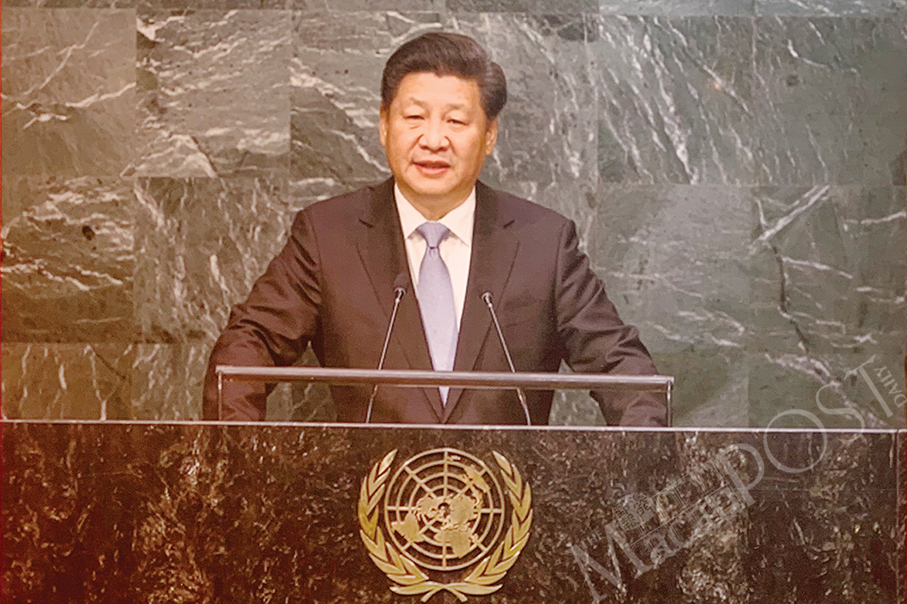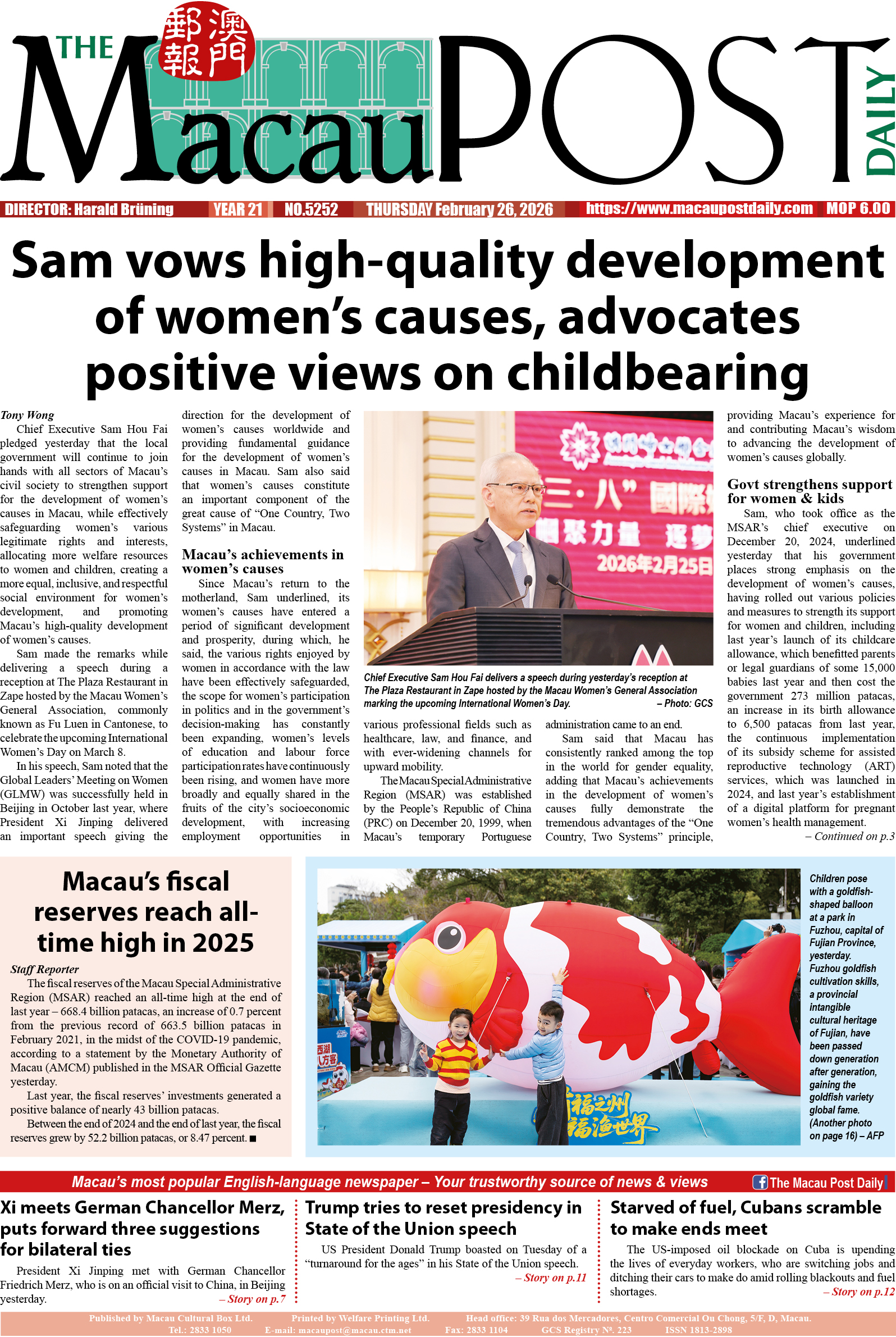Macau’s COVID-19 death toll has increased to five as one more fatality was reported yesterday, an 86-year-old chronically ill woman.
Yesterday’s fatality came after the city reported two COVID-19 deaths in two days this week, Macau’s third one which was reported on Tuesday and its fourth one which was reported on Wednesday. Both were chronically ill female senior citizens, aged 88 and 94 respectively.
The city has had three new COVID-19 fatalities in three days.
Lei Wai Seng, a clinical director of the public Conde de São Januário Hospital Centre, announced the latest and fifth COVID-19 death during yesterday evening’s daily press conference about the city’s current outbreak. He expressed the government’s condolences to the bereaved family.
According to Lei, the woman was taken to the Health Bureau’s (SSM) Public Health Clinical Centre in Coloane on Wednesday last week for isolation treatment after she tested positive for COVID-19 the previous day.
The woman suffered various chronic diseases such as chronic kidney disease, dementia, and repeated gastrointestinal bleeding, Lei said.
Lei said that the woman had already come down with pneumonia before she was admitted to isolation.
During the treatment at the Public Health Clinical Centre, the woman had come down with gastrointestinal bleeding again, and her pneumonia had deteriorated, Lei said.
In addition to the viral infection, Lei said, the woman’s pneumonia had also been caused by a bacterial infection. Eventually the woman came down with septic shock, before she died at around 11 a.m. yesterday, Lei said.
The senior citizen’s family members told doctors that they did not want her to receive invasive medical treatment, because of which the doctors decided not to give her treatment with life-saving equipment, Lei said.
The woman had lived in Fai Fu Building, a social housing estate for senior citizens in Fai Chi Kei, before she was admitted to isolation, according to Lei.
Fai Fu Building is one of the “red zone” buildings across the city that are being locked down due to detection of COVID-19 cases.
The latest three COVID-19 fatalities, which have been reported on three consecutive days this week, came after Macau reported its first two COVID-19 deaths on July 3. Both were chronically ill female senior citizens, aged 100 and 94 respectively, who lived in the same nursing home.
According to Lei, the woman who died yesterday had previously received two Sinopharm inactivated jabs.
Three of the five COVID-19 fatalities had previously received two Sinopharm jabs, while the other two had not been vaccinated against COVID-19.
Lei noted yesterday that all five COVID-19 fatalities were chronically ill senior citizens. Lei underlined that chronically ill seniors who have been infected with COVID-19 are very likely to come down with complications from their chronic diseases, adding that such a situation is “very likely” to result in death.
Outbreak tally rises by 29 to 1,644
The latest tally of Macau’s current COVID-19 outbreak has increased by 29 to 1,644, according to a Novel Coronavirus Response and Coordination Centre statement yesterday morning. The 29 new locally transmitted cases were detected between 00:00 a.m. and 11:59 p.m. on Wednesday, raising the outbreak tally from 1,615 as of Tuesday night to 1,644 as of Wednesday night.
The current outbreak’s latest tally of 1,644 includes the five COVID-19 fatalities.
The statement said that 26 of the 29 new local cases reported on Wednesday were detected among COVID-19 carriers subject to management and control measures, namely lockdowns and hotel quarantine, while just three cases were detected in the community, comprising one close contact of a previously reported COVID-19 case, one case detected by mass nucleic acid tests (NATs) or among high-risk key groups of people, and one case detected among other groups of people.
The number of daily new cases was up by 93 on Saturday, 59 on Sunday, 57 on Monday, and 32 on Tuesday. The Health Bureau said on Wednesday that the downward trend is an indication that the government’s combination of various COVID-19 measures have been effective in bring down the number of COVID-19 infections in the community, such as frequent and multiple rounds of mandatory citywide nucleic acid tests, mandatory tests for key groups of people, rapid antigen self-test’s for everyone, and the government’s ongoing seven-day executive order that enables Macau to get into a state of “relatively static” movement of people.
Yesterday was the fourth day of the local government’s seven-day special measures during which all businesses in Macau must close except those essential for maintaining civil society’s normal functioning or residents’ daily lives, and everyone must stay at home unless going to work, buying daily necessities, or going out for other necessary tasks or urgent matters, such as going to NAT stations for their mandatory tests or going to healthcare facilities to seek medical treatment.
According to the seven-day special COVID-19 prevention and control measures, which are implemented based on an executive order by Chief Executive Ho Iat Seng promulgated in the Official Gazette (BO) on Saturday, everyone must wear a facemask when going out, while all adults must wear a KN95 facemask or those of higher standards. The special measures took effect at 00:00 Monday and are slated to end at 11:59 p.m. on Sunday.
Anyone violating the order, including those failing to wear a KN95 facemask or those of higher standards when going out, faces up to two years in jail or a hefty fine.
505 oral warnings for control-measure violators
During yesterday evening’s press conference, senior Unitary Police Service (SPU) officer Cheong Kin Ian said that between 00:00 a.m. and 3 p.m. yesterday, officers of various law enforcement agencies and inspectors of other public entities had given 505 violators of the executive order an oral warning. Cheong also said that since Monday’s commencement of the implementation of the executive order, law enforcement agencies had booked 25 people for violating the order, as of 3 p.m. yesterday.
‘Too early’ to reveal next week’s control measures
Meanwhile, Health Bureau official Leong Iek Hou said during yesterday’s press conference that it was still too early for the government to decide and reveal whether it would change its COVID-19 measures for next week. But Leong was quick to add that if the government decided not to continue with the implementation of the ongoing executive order for next week, it would need to roll out new COVID-19 measures that would also be “very strict”.
For example, Leong said, the possibly “very strict” measures could include those which aim to ensure that people will not gather at workplaces, one that bars people from having a meal at workplaces, or one that requires key groups of people to undergo a regular nucleic acid test even more frequently than now.
Lei Wai Seng, a clinical director of the public Conde de São Januário Hospital Centre, addresses yesterday’s press conference about the city’s current COVID-19 outbreak.
Photo: Tony Wong









